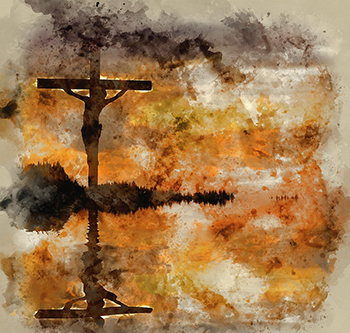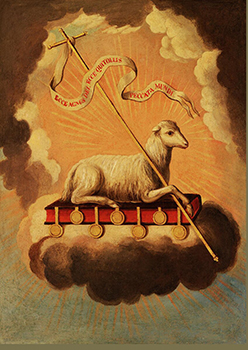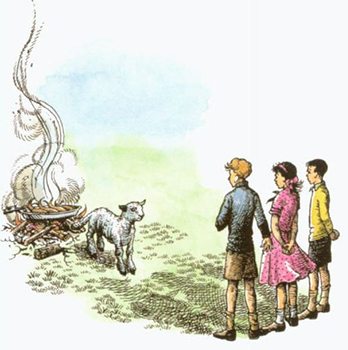From Our Archive
Debie Thomas, "When All Are Welcome" (2021) and "Abide" (2018); Dan Clendenin, "Philip of Caesarea" (2015).
For Sunday April 28, 2024
Lectionary Readings (Revised Common Lectionary, Year C)
1 John 4:7-21
John 15:1-8
Psalm 22:24-30
This Week's Essay
THANK YOU to Michael Fitzpatrick for a six-week series of lectionary essays from Easter to Pentecost. Michael was a regular staff writer for JWJ from 2020 to 2023. He is a U. S. Army veteran and philosopher. He served five years in the Army as a Chaplain's Assistant, which included two deployments to Iraq during 2004-05 and 2006-08. Michael is finishing his PhD at Stanford University.
The late Christopher Hitchens, self-styled antagonist of all things religious, was famous for a particularly pointed question in his many debates with religious apologists. Faced with their insistence that religious life and practice provides a foundation for right living and good behavior, Hitchens would demand of his interlocutors, “Name one moral action that you as a Christian [etc.] can perform that I, as an atheist, cannot!”
The quip served as a sort of mic drop, an unanswerable rhetorical question making the point that it is absurd to suggest that a non-religious person lacks some moral capacity that cannot be supplied by reason, empathy, and common sense. His jab largely worked, with most debaters becoming tongue-tied as they tried to drum up an equally witty rejoinder that would rescue them from Hitchens’ sophistical trap.
I cannot speak for other religious traditions, but for Christian faith and life, I believe there is a satisfying answer to Hitchens’ challenge, and it starts with 1 John 4.7.
“Dear friends, let us love one another…”
 |
|
He first loved us.
|
Bah! I can almost hear Christopher Hitchens retort. Anyone can do that! Can anyone though? The sentence concludes, “… for love comes from God.” John goes further and says that anyone and everyone who loves is “born of God and knows God.” Something more is being suggested here than selfless acts. Of course, it’s worth noting that John is not writing about atheists but those who call themselves followers of Christ yet do not love one another. “Whoever does not love does not know God, because God is love” (v. 8). True love, on John’s conception, is something that might scandalize the self-righteous religious devotee just as much as it does the non-believer.
Why do we have to know God in order to love? Because without knowing God, we cannot know what love is, John claims. That’s quite an astonishing assertion! We must know the God revealed in Jesus to even know what love is. John builds his case upon three premises: that God shows us what love is, that God loves us first, and that because he first loves us we should and can love others.
“This is how God showed his love among us: He sent his one and only Son into the world that we might live through him.”
Conceptions and definitions of love are legion and certainly a justice-impassioned secularist like Christopher Hitchens could live out many of them. But John has a particular form of love in mind, the love of God gifting us life through Jesus. Popular notions that Jesus died because God needed someone to punish before forgiving us or to provide “fire-insurance” to keep us out of hell have no place in John’s epistle. As seen in the previous chapters of the letter, John views us as people who are mired in “death,” who need a sacrifice that will raise us from the dead. This is not an image of God’s anger or hatred towards us, but of God’s love in making the sacrifice we need so that through participation in Jesus we can live.
“This is love: not that we loved God, but that he loved us and sent his Son as an atoning sacrifice for our sins.”
John’s conception of love is not anthropocentric but theocentric; it’s about God, not about us. It’s not about how much we love God (the pagans in John’s day were all about showing their “love” for their gods with endless bribes), but about how God has loved us. Specifically, how God has first loved us before we loved God.
 |
|
Lamb of God, painting by Puerto Rican artist José Campeche y Jordán.
|
I’ve had a lot of friends over the years ask me, “Why did God need Jesus to die? Why can’t God just forgive us of our sins?” Well … God didn’t need Jesus to die, and God did just forgive us of our sins! God’s love is so complete that God doesn’t need anything — we are the ones who need Jesus to die so that we can participate in God’s forgiveness through the atoning sacrifice for our sins. When we testify that “Christ died for our sins,” we are acknowledging that God first loves and forgives us, and therefore sends Christ to die as an atoning sacrifice so that we might participate in that love and forgiveness. Christ did not die because God needs something. Christ died because we need something! Christ died for us, not for his Father! The Father has never needed Christ to die in order to forgive. Rather, the Father forgives us by sending Christ to die. We need the precious blood and body of our savior so that we might be born again into the transformed life that comes about by the forgiveness of God.
So the atoning sacrifice is the act that follows from God’s preceding love and forgiveness. It is what God does to bring us life. God always makes the first move.
“Dear friends, since God so loved us, we also ought to love one another. No one has ever seen God; but if we love one another, God lives in us and his love is made complete in us.”
We come to the moral act that Christopher Hitchens could not perform. Christians love because God in Christ first loved us. Meditate slowly over the logic of John’s declaration: it is because God has so loved us that we ought — we are obligated — to love one another. The deep root of Christian ethics is unearthed.
The human ethical problem is that in order to flourish we need to love one another. But we hurt one another, deceive one another, neglect one another. As such, we do not deserve each other’s love. We struggle to love people we resent, just as others struggle to love us in our sinful ways. Someone has to take the first step to love the undeserving. But who has such an infinite well of grace in their heart?
In the midst of this Gordian knot of human despair, God acts. Before we can do anything to earn God’s love or forgiveness, God breaks this cycle of resentment by loving us decisively in Jesus. Since we struggle to love those we don’t think deserve our love, God first loves us when we don’t deserve his love. “Christ died for the ungodly,” for the enemies of God, Paul puts it in Romans 5. God graciously loves us first, and in response we graciously love others as he has first loved us. The emancipatory power of this truth should stagger us — we are freed to love the undeserving because our love is no longer conditioned by their behavior towards us. We’re not loving them because of who they are, nor in spite of who they are. Our love is independent of them altogether; we love in grateful response to the infinite love of God that has been already given to us, people just as undeserving as anyone else.
That is the ethical deed Christopher Hitchens could not produce. He could not love his enemies as God had first loved him. He could not forgive another as Christ had first forgiven him.
 |
|
Illustration of the Lamb at the End of the World in C. S. Lewis' The Voyage of the Dawn Treader.
|
Yet this is not grounds for boasting, for feeling superior to the now deceased heathen orator. As we noted earlier, John’s primary audience is not those who do not yet know the voice of the Good Shepherd, but those who claim to already know Christ’s voice. John warns, “Whoever claims to love God yet hates a sister or brother is a liar. For whoever does not love their sister and brother whom they have seen, cannot love God, whom they have not seen. And he has given us this command: Anyone who loves God must also love their sister and brother” (vv. 20-21). Many of Christopher Hitchens’ grievances against Christians concerned not seeing love in our lives.
The flip side of the acclamation that “we love because he first loved us” is that if we do not love others, then we do not love God, because loving others is our response to God loving us. God loves us, we love God in response, and the action of loving God in response is to love each other. We cannot persist in hate if we truly “acknowledge that Jesus is the Son of God” (v. 15), because then we would “know and rely on the love God has for us” (v. 16).
So what are we to do? Go and be like Jesus (v. 17). Love graciously and completely. Then we will be in God and God will be in us. But we will never produce such love under our own strength and resolve. Only if we first appreciate the magnitude of God’s gracious love for us, expressed in Christ as the atoning sacrifice, can we be truly free to graciously love others. Only then will we be indifferent to our estimation of them — friend or foe, sibling or enemy, kin or stranger — because in response to God's love for us, we will love them completely just the same.
Weekly Prayer
Christina Rosetti (1830–1894)
I was hungry, and Thou feddest me;
Yea, Thou gavest drink to slake my thirst:
O Lord, what love gift can I offer Thee
Who hast loved me first?—Feed My hungry brethren for My sake;
Give them drink, for love of them and Me:
Love them as I loved thee, when Bread I brake
In pure love of thee.—Yea, Lord, I will serve them by Thy grace;
Love Thee, seek Thee, in them; wait and pray:
Yet would I love Thyself, Lord, face to face,
Heart to heart, one day.—Let today fulfil its daily task,
Fill thy heart and hand to them and Me:
Tomorrow thou shalt ask, and shalt not ask
Half I keep for thee.
Michael Fitzpatrick cherishes comments and questions via m.c.fitzpatrick@outlook.com
Image credits: (1) Michael Fitzpatrick; (2) Fine Art America; and (3) Pinimg.com.





